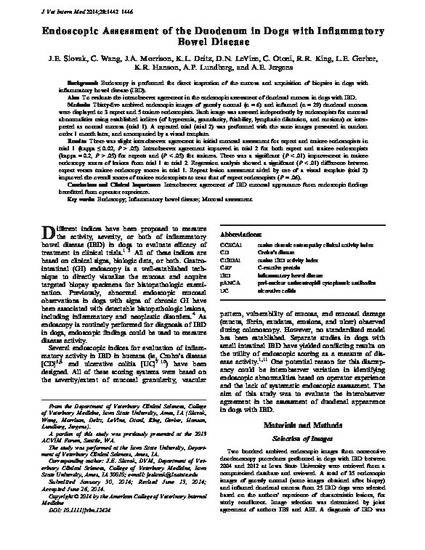
Background: Endoscopy is performed for direct inspection of the mucosa and acquisition of biopsies in dogs with inflammatory bowel disease (IBD). Aim: To evaluate the interobserver agreement in the endoscopic assessment of duodenal mucosa in dogs with IBD. Methods: Thirty-five archived endoscopic images of grossly normal (n = 6) and inflamed (n = 29) duodenal mucosa were displayed to 3 expert and 5 trainee endoscopists. Each image was assessed independently by endoscopists for mucosal abnormalities using established indices (of hyperemia, granularity, friability, lymphatic dilatation, and erosions) or interpreted as normal mucosa (trial 1). A repeated trial (trial 2) was performed with the same images presented in random order 1 month later, and accompanied by a visual template. Results: There was slight interobserver agreement in initial mucosal assessment for expert and trainee endoscopists in trial 1 (kappa ≤ 0.02, P > .05). Interobserver agreement improved in trial 2 for both expert and trainee endoscopists (kappa = 0.2, P > .05) for experts and (P < .05) for trainees. There was a significant (P < .01) improvement in trainee endoscopy scores of lesions from trial 1 to trial 2. Regression analysis showed a significant (P < .01) difference between expert versus trainee endoscopy scores in trial 1. Repeat lesion assessment aided by use of a visual template (trial 2) improved the overall scores of trainee endoscopists to near that of expert endoscopists (P = .06). Conclusions and Clinical Importance: Interobserver agreement of IBD mucosal appearance from endoscopic findings benefitted from operator experience.
Available at: http://works.bepress.com/chong-wang/79/

This article is from Journal of Veterinary Internal Medicine 28 (2014); 1442, doi: 10.1111/jvim.12424. Posted with permission.